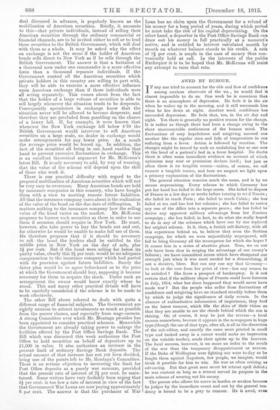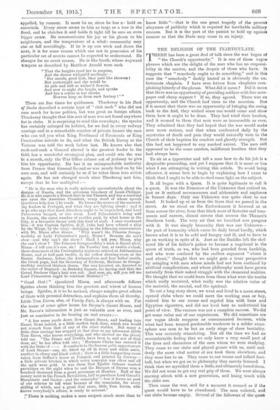AWED BY RUMOUR.
IF any one tried to account for the ebb and flow of confidence among anxious observers of the wa , he would find it almost impossible to do so. One week he is conscious that there is an atmosphere of depression. He feels it in the air when he wakes up in the morning, and it still surrounds him when he lies down at night. Another week confidence has succeeded depression. He feels that, too, in the air day and night. Yet there is generally no positive reason for the change. It is rather as though there had been a change owing to the sheer unaccountable restlessness of the human mind. The fluctuations of easy hopefulness and misgiving succeed one another like the regular rises and falls of temperature in one suffering from a fever. Action is followed by reaction. The changes might be traced by such an undulating line as one sees at the head of a patient's bed in a fever hospital. No doubt there is often some immediate evidence on account of which optimism may soar or pessimism declare itself ; but just as often there is no tangible reason—unless, of course, we call rumour a tangible reason, and hero we suspect we light upon a primary explanation of the fluctuations.
The general situation remains much the same, and is by no means unpromising. Every scheme to which Germany has put her hand has failed in the large sense. She failed to dispose of France in a few days or weeks befoie turning to reed Russia ; she failed to reach Paris ; she failed to reach Calais ; she has failed at sea and has lost her colonies ; she has failed to entice any one of the Allies into a separate peace ; she has failed to derive any apparent military advantage from her Russian campaign ; she has failed, in fact, to do what she really hoped to do in any of the schemes which have one by one replaced her original scheme. Is it, then, a foolish self-flattery, with all this experience behind us, to believe that even the Serbian campaign, for which we were unjustifiably unprepared, will fail to bring Germany all the recompense for which she hopes ? It comes late in a series of abortive plans. True, we on our side have been slow in reaping the advantage of our enemy's failures ; we have committed errors which have dissipated our strength just when it was most needed for a demoralizing, if not a decisive, blow. But can any one say that Germany— to look at the case from her point of view—has any reason to be satisfied ? She faces a prospect of bankruptcy. Is it not certain that if the military clique of Prussia could have foreseen in July, 1914, what has since happened they would never have made wart But the people who suffer from fluctuations of confidence and misgiving have no standard steadily before them by which to judge the significance of daily events. In the absence of authoritative information of importance, they feed on the latest rumour, which fills the skies of their vision so that they are unable to see the clouds behind which the sun is shining. Or, of course, it may be just the reverse—a local success somewhere, because it appears in the newspapers in huge type (though the use of that type, after all, is all in the discretion of the sub-editor, and exactly the same news printed in small type and tucked away in a corner would make no impression on the volatile reader), sends their spirits up to the heavens. The local success, however, is no more an index to the result of the war than the temporary disappointment or reverse. If the Duke of Wellington were fighting our wars to-day as he fought them against Napoleon, few people, we imagine, would think it possible for him to win. He was as often retiring as advancing. But that great man never let retreat spell defeat ; he was content so long as a retreat served its purpose in the main scheme of wearing out his enemy.
The person who allows his nerve to harden or weaken because he judges by the immediate event and not by the general ten• dency is bound to be a prey to rumour. He is awed, even
appalled, by rumour. It must be so, since he has n' hold on essentials. Every straw seems to him as large as a tree in the flood, and he clutches it and holds it tight till he sees an even bigger straw. He communicates his joy or his gloom to his neighbours, and the temperature of a whob community may rise or fall accordingly. If he is up one week and down the next, it is for some reason which one not in possession of his particular set of secrets cannot be expected to understand. He changes for no overt reason. He is like Iseult, whose wayward tempers as described by Matthew Arnold were such
" That the knights eyed her in surprise,
And the dames whisper'd scoffingly-
' Her moods, good lack, they pass like showers
But yesternight and she would be As pale and still as wither'd flowers, And now to-night she laughs and speaks And has a colour in her cheeks. Heaven keep us from such fantasy I ' "
These are fine times for quidnunos. Thaekeray in his Book of Snobs described a certain type of club snob " who did not care much for home politics, but was great on foreign affairs. Thaekeray thought that this sort of man was not found anywhere but in clubs. It is surprising to read this nowadays ; the species has certainly enlarged its habitat, for we find in every railway carriage and in a remarkable number of private houses the man who can tell you what Xing Ferdinand of Roumania or King Constantine intends to do, and what the British Envoy at the Vatican was told the week before last. He knows also that such-and-such a General abroad is the greatest leader in the field, has a wonderful strategical plan, and could win the war in a month, only the War Office refuses out of jealousy to give him his opportunity. He has it on unimpeachable authority from France that General So-and-so was nearly fired on by his own men, and will certainly be so if he takes them into action again. He has not changed much since Thaekeray met him, except that he has multiplied :- " Ho is the man who is really seriously uncomfortable about the designs of Russia, and the atrocious treachery of Louis-Philippe. He it is who expects a Froneh fleet in the Thames, and has a constant eye upon the American President, every word of whose speech (goodness help him I) he reads. Ho knows the names of the contend. ing leaders in Portugal, and what they are fighting about : and it is he who says that Lord Aberdeen ought to be impeached, and Lord Palmerston hanged, or vice versa. Lord Palmerston's being sold to Russia, the exact number of roubles paid, by what house in the City, is a favourite theme with this kind of snob. 1 once overheard him—it was Captain Spitfire, R.N. (who had been refused a ship by the Whigs, by the way)—indulging in the following conversation
with Mr. Minns after dinner. Why wasn't the Princess Scrap, moffsky at Lady Palmerston's party, Minns ? Because she can't show—and why can't she show ? Shall I tell you, Minns, why she can't show ? The Princess Scragamoffsky'a back is flayed alive, Minns—I tell you it's raw, sir On Tuesday last, at twelve o'clock, three drummers of the Preobajinsky regiment arrived at Ashburnham House, and at half-past twelve, in the yellow drawing-room at the Russia Embassy, before the Ambassadress and four ladies'-maids, the Greek papa, and the Secretary of Embassy, Madame do &raga- moffsky received thirteen dozen. She was knouted, sir, knouted in the midst of England—in Berkeley Square, for having said that the Grand Duchess Olga's hair was red. And now, sir, will you tell me Lord Palmerston ought to continue Minister ? ' "
" Good God " ejaculated Minns, and afterwards follows Spitfire about thinking him the greatest and wisest of human beings. Spitfire, it is to be noticed, always mingles great affairs of State with personal detraction, and explains them all thereby.
Little Tom Eaves, also, of Vanity Fair, is always with us. Put the name of some ether house for Steyne's Gaunt House, and Mr. Eaves's information is just as valuable now 'as over, and just as conclusive in its bearing on real events :-- " A few snore yards down Now Gaunt Street, and loading into Gaunt Mews indeed, is a little modest back door, which you would not remark from that of any of the other stables. But many a little close carriage has stopped at that door as my informant (little Tom Eaves, who knows everything, and who showed me the place) told me. ' The Prince and Perdita have been in and oat of that door, sir' ' he has often told one ; ' Marianne Clarke has entered it with the Duke of —. It conducts to the famous petits appartement8 of Lord Steyne—one, sir, fitted up all in ivory and white satin, another in ebony and black velvet ; there is a little banqueting-room taken from Sallust's house at Pompeii, and painted by Cosway- a little private kitchen in which every saucepan was silver and all the spits were gold. It was there that Egalit6 Orleans roasted partridges on the night when he and the Marquis of Stoyne won a hundred thousand from a groat personage at Hombre. Half of the money wont to the French Revolution, half to purchase Lord Gaunt's Marquisate and Garter—and the remainder '—but it forms no part of our scheme to tell what became of the remainder, for every shilling of which, and a great deal more, little Tom Eaves, who knows everybody's affairs, is ready to account."
There is nothing makes a man suspect much more than to know little "—that is the one great tragedy of the present abeyance of publicity which is required for inevitable military reasons. But it is the part of the patriot to hold up against rumour so that the State may come to no injury.











































 Previous page
Previous page